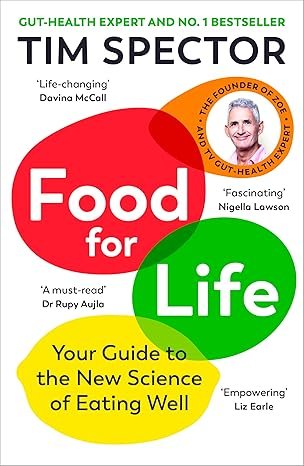
Why Food for Life by Tim Spector Redefines the Science of Eating Well
Modern nutritional guidance often reduces food to numbers: calories, macros, or glycemic load. Yet beneath this oversimplified lens lies a complex, evolving science—one that Food for Life by Tim Spector examines with clarity and precision. The book challenges outdated dietary dogma and reframes eating as a biological, cultural, and ecological act.
Understanding Food Through the Lens of Microbial Science
One of the central contributions of Food for Life lies in its deep dive into the human microbiome. Instead of viewing digestion as a mechanical process, Tim Spector presents it as a symbiotic relationship between the human host and trillions of microorganisms. These microbes influence metabolism, immunity, and even mental health, redefining what it means to eat “healthily.”
This microbial framework offers a more nuanced understanding of food. For example, fiber isn’t simply “good” because it’s filling, it feeds the gut microbiota, which in turn regulates inflammation and nutrient absorption. Such insights dismantle many mainstream diet trends that ignore individual variation and microbial diversity.
A Shift from Restriction to Diversity in Food for Life by Tim Spector
In contrast to restrictive diet plans, Food for Life by Tim Spector promotes dietary diversity as a marker of health. Drawing from global dietary patterns and epidemiological studies, the book demonstrates how a broad range of minimally processed plant-based foods supports long-term well-being.
The emphasis on variety over arbitrary avoidance, marks a departure from conventional approaches. Rather than vilifying entire food groups or nutrients, the book encourages incorporating fermented foods, herbs, spices, legumes, and whole grains in daily meals. This diversity feeds a resilient microbiome and supports metabolic flexibility.
Personalized Nutrition Replaces the “One-Size-Fits-All” Model
Perhaps the most disruptive idea in Food for Life is its rejection of universal dietary prescriptions. Through his work with the ZOE project, Spector shows how individuals respond differently to the same foods, based on their genes, microbes, and lifestyle factors.
This personalization model emphasizes listening to biological feedback rather than external rules. What improves health in one person may provoke inflammation or fatigue in another. The book equips readers with scientific reasoning, not rigid formulas, inviting experimentation and self-awareness.
Conclusion: A Scientific and Cultural Reframing of Food
Food for Life by Tim Spector stands apart as both a scientific treatise and a cultural critique. It replaces outdated nutritional myths with rigorous, microbiome-informed insights and empowers a more informed relationship with food.
By reframing eating as a dynamic interaction between body and environment, the book offers not just better health, but a renewed respect for the complexity of food itself.
About Tim Spector
Tim Spector, MD, stands at the forefront of gut health research and nutritional science. As co-founder of the nutrition company ZOE, he has played a key role in reshaping how science approaches diet and health. Known for his ability to explain complex scientific ideas with both clarity and style, Spector brings a unique voice to the field. His bestselling book, Food for Life, blends the latest scientific findings with personal insight to present a fresh, evidence-based perspective on how to eat well.
